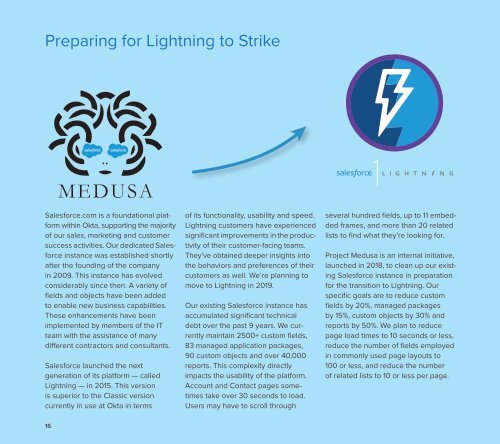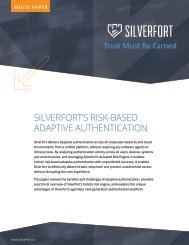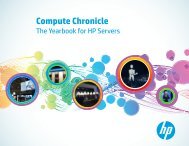OK1_Brochure_pages
Create successful ePaper yourself
Turn your PDF publications into a flip-book with our unique Google optimized e-Paper software.
Preparing for Lightning to Strike<br />
Best Practices in SaaS Management<br />
Salesforce.com is a foundational plat -<br />
form within Okta, supporting the majority<br />
of our sales, marketing and customer<br />
success activities. Our dedicated Salesforce<br />
instance was established shortly<br />
after the founding of the company<br />
in 2009. This instance has evolved<br />
considerably since then. A variety of<br />
fields and objects have been added<br />
to enable new business capabilities.<br />
These enhancements have been<br />
implemented by members of the IT<br />
team with the assistance of many<br />
different contractors and consultants.<br />
Salesforce launched the next<br />
generation of its platform — called<br />
Lightning — in 2015. This version<br />
is superior to the Classic version<br />
currently in use at Okta in terms<br />
of its functionality, usability and speed.<br />
Lightning customers have ex perienced<br />
significant improvements in the productivity<br />
of their customer-facing teams.<br />
They’ve obtained deeper insights into<br />
the behaviors and pref er ences of their<br />
customers as well. We’re planning to<br />
move to Lightning in 2019.<br />
Our existing Salesforce instance has<br />
accumulated significant technical<br />
debt over the past 9 years. We currently<br />
maintain 2500+ custom fields,<br />
83 managed application packages,<br />
90 custom objects and over 40,000<br />
reports. This complexity directly<br />
impacts the usability of the platform.<br />
Account and Contact <strong>pages</strong> sometimes<br />
take over 30 seconds to load.<br />
Users may have to scroll through<br />
several hundred fields, up to 11 em bedded<br />
frames, and more than 20 related<br />
lists to find what they’re looking for.<br />
Project Medusa is an internal initiative,<br />
launched in 2018, to clean up our existing<br />
Salesforce instance in preparation<br />
for the transition to Lightning. Our<br />
specific goals are to reduce custom<br />
fields by 20%, managed packages<br />
by 15%, custom objects by 30% and<br />
reports by 50%. We plan to reduce<br />
page load times to 10 seconds or less,<br />
reduce the number of fields employed<br />
in commonly used page layouts to<br />
100 or less, and reduce the number<br />
of related lists to 10 or less per page.<br />
In addition to the cleanup efforts being<br />
conducted as part of Project Medusa,<br />
we’re establishing new standards<br />
and governance practices to limit the<br />
growth of technical debt in the future.<br />
These steps include:<br />
Mapping and documenting all API<br />
connections<br />
Multiple applications and websites<br />
exercise Salesforce APIs to transfer<br />
data into or out of our instance. We<br />
are cataloging all API connections and<br />
documenting the nature of the data<br />
being transferred. We are hoping to<br />
reduce duplicative connections and<br />
eliminate references to APIs that<br />
are not being actively used.<br />
Establishing consistent data<br />
definitions for key business terms<br />
We are documenting the name, data<br />
type, description and host object of<br />
all fields and establishing consistent<br />
naming conventions for interrelated<br />
fields that appear in multiple objects.<br />
Standardizing architectural, coding<br />
and testing practices<br />
Standard construction practices for<br />
custom object development will<br />
enable greater reuse of such objects<br />
in the future and make it easier to<br />
maintain customized enhancements<br />
implemented by temporary contractors<br />
and consultants.<br />
Ensuring that material changes to all<br />
of the above are formally reviewed<br />
and approved<br />
We’ve established an IT Change<br />
Approval Board which meets weekly<br />
to review all material modifications<br />
to our instance.<br />
Finally, we intend to implement new<br />
tools to proactively monitor system<br />
health by continuously measuring<br />
database response times and page<br />
loading times.<br />
16 17






